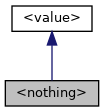 |
Qore Programming Language Reference Manual
0.9.3
|
 |
Qore Programming Language Reference Manual
0.9.3
|
Methods in this pseudo-class can be executed on NOTHING. More...

Public Member Methods | |
| SingleValueIterator | contextIterator () |
| Returns an empty SingleValueIterator object. More... | |
| nothing | firstKey () |
| Returns NOTHING. More... | |
| nothing | firstValue () |
| Returns NOTHING. More... | |
| bool | hasKey (softstring key) |
| Returns True if the key exists in the hash (may or may not be assigned a value), False if not. More... | |
| bool | hasKeyValue (softstring key) |
| Returns True if the key exists and is assigned to a value, False if not. More... | |
| SingleValueIterator | keyIterator () |
| Returns an empty SingleValueIterator object. More... | |
| list< string > | keys () |
| Returns an empty list. More... | |
| nothing | lastKey () |
| Returns NOTHING. More... | |
| nothing | lastValue () |
| Returns NOTHING. More... | |
| int | lsize () |
| Returns 0. More... | |
| SingleValueIterator | pairIterator () |
| Returns an empty SingleValueIterator object. More... | |
| SingleValueIterator | rangeIterator () |
| Returns an empty SingleValueIterator object. More... | |
| int | typeCode () |
| Returns Qore::NT_NOTHING. More... | |
| list< auto > | values () |
| Returns an empty list. More... | |
 Public Member Methods inherited from <value> Public Member Methods inherited from <value> | |
| bool | callp () |
| Returns False; this method is reimplemented in other types and will return True if the given expression is a callable value (ie closures or call references) More... | |
| bool | complexType () |
| returns True if the value has a complex type, False if not More... | |
| bool | empty () |
| Returns True; this method will be reimplemented in container types where it may return False. More... | |
| string | fullType () |
| returns the full type name which differs from the simple type name in case of complex types and objects More... | |
| bool | intp () |
| Returns False; this method is reimplemented in other types and will return True if the given expression can be converted to an integer. More... | |
| AbstractIterator | iterator () |
| Returns an iterator object for the value; the default iterator object returned is SingleValueIterator. More... | |
| int | lsize () |
| Returns 1; the return value of this method should give the list size of the value, which is normally 1 for non-lists (except for NOTHING where the size will be 0) and the number of the elements in the list for lists; this method will be reimplemented in other types where it may return other values. More... | |
| int | size () |
| Returns zero; this method will be reimplemented in container types where it may return a non-zero value. More... | |
| bool | sizep () |
| Returns True if the type can return a non-zero size (True for containers including binary objects and strings, False for everything else) More... | |
| bool | strp () |
| Returns False; this method is reimplemented in other types and will return True if the given expression can be converted to a string. More... | |
| bool | toBool () |
| Returns the boolean representation of the value; the default is False. More... | |
| float | toFloat () |
| Returns the floating-point representation of the value; the default is 0.0. More... | |
| int | toInt () |
| Returns the integer representation of the value; the default is 0. More... | |
| number | toNumber () |
| Returns the arbitrary-precision numeric representation of the value; the default is 0. More... | |
| string | toString () |
| Returns the string representation of the value; the default is an empty string. More... | |
| string | type () |
| Returns the string type for the value. More... | |
| int | typeCode () |
| Returns the type code for the value. More... | |
| bool | val () |
| Returns False; this method is reimplemented in other types and will return True if the given expression has a non-empty value. More... | |
Methods in this pseudo-class can be executed on NOTHING.
| SingleValueIterator <nothing>::contextIterator | ( | ) |
Returns an empty SingleValueIterator object.
| nothing <nothing>::firstKey | ( | ) |
Returns NOTHING.
| nothing <nothing>::firstValue | ( | ) |
Returns NOTHING.
| bool <nothing>::hasKey | ( | softstring | key | ) |
Returns True if the key exists in the hash (may or may not be assigned a value), False if not.
| key | the key name to check |
| bool <nothing>::hasKeyValue | ( | softstring | key | ) |
Returns True if the key exists and is assigned to a value, False if not.
| key | the key name to check |
| SingleValueIterator <nothing>::keyIterator | ( | ) |
Returns an empty SingleValueIterator object.
Returns an empty list.
| nothing <nothing>::lastKey | ( | ) |
Returns NOTHING.
| nothing <nothing>::lastValue | ( | ) |
Returns NOTHING.
| int <nothing>::lsize | ( | ) |
| SingleValueIterator <nothing>::pairIterator | ( | ) |
Returns an empty SingleValueIterator object.
| SingleValueIterator <nothing>::rangeIterator | ( | ) |
Returns an empty SingleValueIterator object.
| int <nothing>::typeCode | ( | ) |
| list<auto> <nothing>::values | ( | ) |
Returns an empty list.